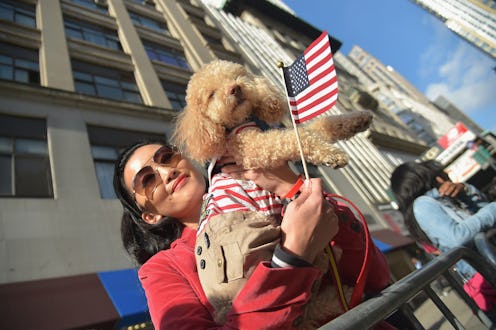Life
Here’s How To Keep Your Dog Safe On Fourth Of July, According To Vets

The Fourth of July is just around the corner, and many folks are gearing up to dive into the celebration with a holiday staple: fireworks. However, just like some people, dogs and cats can get fearful and anxious about the booming sound of fireworks — to the point that it can raise health concerns. If you have a four-legged friend that experiences sound phobia, vets agree that being prepared for Fourth of July fireworks can help ensure your pet’s health and safety.
“There's a lot of different signs [of noise aversion], but whether they're mild or severe, need to be taken seriously, because this is a serious medical condition,” Dr. Sharon Campbell, DVM, MS, DACVIM, a veterinarian at animal health company Zoetis, tells Bustle. “If you were to put it into human terms, these dogs are actually suffering a panic attack.”
In fact, as HuffPost reported, July 4 and 5 are some of the busiest days of the year for animal shelters, due to an influx of dogs and cats fleeing home after being spooked by Independence Day fireworks. So, noise aversion — also called noise anxiety and noise phobia — is not something to take lightly. Campbell says the condition can present with many different symptoms in dogs, including yawning, panting, pacing, drooling, hyper-vigilance, barking and whining. In more serious cases, they may try to “escape” the noise, which can present as destructive or self-harming behaviors, like scratching at doors, or jumping through windows. (Here’s a simple quiz to tell if Fido has noise phobia.) Campbell says that, most commonly, cats will hide from the sound; they may also go to the bathroom where they aren’t supposed to, scratch at things, or try to escape like pups.
It’s first important to seek out professional advice from a vet if you suspect you have a fur baby with noise phobia — just as you would schedule an appointment with your own doctor if you were experiencing persistent anxiety. If you have an animal with severe noise phobia symptoms, Campbell explains your pet’s vet may recommend a prescription medication to help calm your dog or cat during fireworks.
If you don’t want to give your pet a prescription medication, there are also natural alternatives you can find at most pet stores. Dr. Oscar Chavez, DVM, the head of JustFoodForDogs' Canine Nutrition Team, and a professor of Canine Clinical Nutrition, says that, “Another option [for dogs] is a calming supplement. [...] Valerian root and passionflower has been researched and shown to be very effective at reducing anxiety in dogs so that is a natural way" to treat noise phobia. (It’s important to note that valerian root and passionflower have the opposite effect on cats.) While research has found there is little evidence supporting holistic therapies for cats, the amino acid L-theanine — which is available in vet-approved supplements — has shown promising results in lowering stress-related symptoms in cats. However, it’s always best to check with your pet’s vet before giving your beloved pup or kitty an over-the-counter supplement.
Furthermore, both Chavez and Campbell agree that creating a safe, cozy, and familiar environment is key to keeping your furry family member comfortable throughout Fourth of July celebrations. Campbell says closing the blinds, muffling the sound with music or a white noise machine, giving your animal a fun distraction (such as a Kong toy), and limiting lights can help lessen some of the fear surrounding fireworks. For some pets, Chavez also recommends investing in a Thundershirt (aka, an anxiety vest that applies light pressure) to keep them calm.
Another technique Campbell suggests is to create a “safe haven” for your dog or cat to go to during any firework shows. “Basically, what you try to do is train the dog to go to a part of the house where the noise is going to be less loud. When the noise isn't occurring, you make that a nice place for the dog to go,” she says. “You can put the dog's bed there, feed them treats there, [or] give them their favorite toy, so they associate that place as a very positive place. That will help to make them feel calmer, because they're in place they've associated with being safe.”
If you can’t train your dog or cat to go to a certain space during the Fourth (I mean, who can train a cat to do anything anyways?), try to take note if they tend to go to the same spot every time there’s a loud noise. That way, Campbell explains, you can still make that area their safe space to wait out the firework shows.
However, it’s not just your furry loved one’s reaction you have to be cautious of during firework season: It’s yours. Chavez says that well-meaning pet parents often reinforce their animal’s fear or anxiety by becoming super concerned when they notice signs of noise aversion. So, one of the best things you can do is stay calm yourself. “If you do that, they'll see sort of the paradox of like, "Okay, there’s a scary thing happening outside, but my owner seems happy, so maybe this is a good thing,’" he explains.
For most animals, Chavez and Campbell say it usually takes a combination of these tips to truly help a pet with sound anxiety get through the Fourth of July — it may just take some time to figure our what works for your furbaby. You can still celebrate and enjoy the holiday, while supporting and loving your pup and feline friend through their firework anxiety.